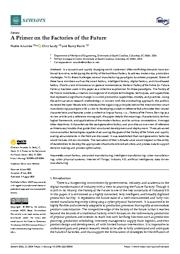A Primer on the Factories of the Future
Noble Anumbe, Clint Saidy, Ramy Harik
2022
Sensors
In a dynamic and rapidly changing world, customers' often conflicting demands have continued to evolve, outstripping the ability of the traditional factory to address modern-day production challenges. To fix these challenges, several manufacturing paradigms have been proposed. Some of these have monikers such as the smart factory, intelligent factory, digital factory, and cloud-based factory. Due to a lack of consensus on general nomenclature, the term Factory of the Future (or Future Factory)
more »
... as been used in this paper as a collective euphemism for these paradigms. The Factory of the Future constitutes a creative convergence of multiple technologies, techniques, and capabilities that represent a significant change in current production capabilities, models, and practices. Using the semi-narrative research methodology in concert with the snowballing approach, the authors reviewed the open literature to understand the organizing principles behind the most common smart manufacturing paradigms with a view to developing a creative reference that articulates their shared characteristics and features under a collective lingua franca, viz., Factory of the Future. Serving as a review article and a reference monograph, the paper details the meanings, characteristics, technological framework, and applications of the modern factory and its various connotations. Amongst other objectives, it characterizes the next-generation factory and provides an overview of reference architectures/models that guide their structured development and deployment. Three advanced communication technologies capable of advancing the goals of the Factory of the Future and rapidly scaling advancements in the field are discussed. It was established that next-generation factories would be data rich environments. The realization of their ultimate value would depend on the ability of stakeholders to develop the appropriate infrastructure to extract, store, and process data to support decision making and process optimization.
doi:10.3390/s22155834
pmid:35957390
pmcid:PMC9370931
fatcat:4gbvuy2yorddfp4j35okzvmlye

